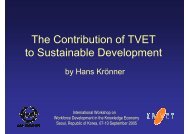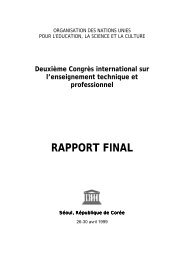Learning for Life, Work and the Future Initial ... - Unesco-Unevoc
Learning for Life, Work and the Future Initial ... - Unesco-Unevoc
Learning for Life, Work and the Future Initial ... - Unesco-Unevoc
Create successful ePaper yourself
Turn your PDF publications into a flip-book with our unique Google optimized e-Paper software.
Page 6 Report on <strong>the</strong> <strong>Work</strong>shop <strong>Learning</strong> <strong>for</strong> <strong>Life</strong>, <strong>Work</strong> <strong>and</strong> <strong>the</strong> <strong>Future</strong><br />
• The need to harness <strong>the</strong> potential of <strong>the</strong> new in<strong>for</strong>mation<br />
technologies to provide technology-based<br />
learning <strong>and</strong> widen access<br />
• The need to introduce proper articulation, accreditation<br />
<strong>and</strong> recognition mechanisms<br />
• The need to acknowledge <strong>and</strong> address <strong>the</strong> impact of<br />
HIV/AIDS on TVET structures <strong>and</strong> delivery<br />
The underlying principle was to have a good quality<br />
TVET system which was flexible, adaptable <strong>and</strong> innovative.<br />
A Steering Committee composed of staff of <strong>the</strong><br />
Botswana Ministry of Education <strong>and</strong> UNESCO’s International<br />
Centre in Bonn was constituted to make <strong>the</strong><br />
necessary arrangements <strong>for</strong> <strong>the</strong> proposed workshop.<br />
To facilitate <strong>the</strong> organisation <strong>and</strong> to enhance <strong>the</strong> teamwork,<br />
an officer from Botswana was seconded to <strong>the</strong><br />
UNESCO International Centre in Bonn <strong>for</strong> five weeks<br />
during <strong>the</strong> preparation stage.<br />
TVET experts from <strong>the</strong> subregion were invited to contribute<br />
to <strong>the</strong> preparation of <strong>the</strong> workshop by submitting<br />
discussion papers on one or two challenges/<br />
issues mentioned above. Altoge<strong>the</strong>r over 60 papers<br />
were submitted. A Consultant, with <strong>the</strong> assistance of<br />
<strong>the</strong> Steering Committee, reviewed <strong>the</strong> papers <strong>for</strong> <strong>the</strong>ir<br />
relevance <strong>and</strong> appropriateness. This evaluation of <strong>the</strong><br />
papers was <strong>the</strong> main criterion <strong>for</strong> <strong>the</strong> selection of <strong>the</strong><br />
participants to <strong>the</strong> workshop. However, <strong>the</strong> Steering<br />
Committee also took into consideration o<strong>the</strong>r criteria<br />
such as geographical spread, gender balance, a<br />
judicious mix of young <strong>and</strong> senior professionals, <strong>and</strong><br />
<strong>the</strong> balance of key issues to be addressed. Finally 70<br />
participants composed of decision makers, heads of<br />
institutions <strong>and</strong> experts in TVET were invited from<br />
twelve Sou<strong>the</strong>rn African countries: Botswana, Lesotho,<br />
Malawi, Mauritius, Mozambique, Namibia, Seychelles,<br />
South Africa, Swazil<strong>and</strong>, <strong>the</strong> United Republic of<br />
Tanzania, Zambia <strong>and</strong> Zimbabwe. Communication<br />
breakdown prevented <strong>the</strong> invited person from <strong>the</strong><br />
Democratic Republic of <strong>the</strong> Congo from participating.<br />
There was no response from Angola. Some resource<br />
persons from UNESCO, Sou<strong>the</strong>rn Africa <strong>and</strong> Europe<br />
were also amongst <strong>the</strong> participants.<br />
Donor agencies were also invited, mainly to participate<br />
during <strong>the</strong> final day when project proposals were<br />
presented <strong>and</strong> discussed in a “Market Place” session,<br />
as described below.<br />
The Main <strong>Work</strong>ing Document was prepared by <strong>the</strong><br />
Consultant with <strong>the</strong> assistance of <strong>the</strong> Steering Committee,<br />
based on <strong>the</strong> content of <strong>the</strong> submitted papers.<br />
(This document can be found on page 11.)<br />
1.4 Opening Plenary Session<br />
The workshop was officially opened on Tuesday,<br />
5 December 2000 in <strong>the</strong> Gaborone Sun Hotel,<br />
Gaborone, in <strong>the</strong> presence of Mr K. G. Kgoroba, <strong>the</strong><br />
Honourable Minister <strong>for</strong> Education of <strong>the</strong> Republic of<br />
Botswana. Invited guests included Heads of Diplomatic<br />
Missions in Botswana <strong>and</strong> representatives of<br />
several bilateral <strong>and</strong> international donor agencies.<br />
In his opening address, <strong>the</strong> Minister underscored <strong>the</strong><br />
use of ICT to exp<strong>and</strong> access to education, increase<br />
flexibility in delivery <strong>and</strong> improve quality. He stated<br />
that changes in <strong>the</strong> world economy coupled with rapid<br />
advances in communication technologies are having an<br />
enormous effect on <strong>the</strong> labour market. This has resulted<br />
in a high level of unemployment, retrenchment<br />
<strong>and</strong> frequent job changes, emphasizing <strong>the</strong> need <strong>for</strong><br />
multiskilling, lifelong access to education <strong>and</strong> training,<br />
<strong>and</strong> support <strong>for</strong> small <strong>and</strong> micro business ventures <strong>and</strong><br />
in<strong>for</strong>mal sector activities. This in turn has changed <strong>the</strong><br />
role of education <strong>and</strong> training. The Minister emphasized<br />
that <strong>the</strong> initiative was a response to a situation<br />
whereby most countries in <strong>the</strong> subregion tended to<br />
have closer links to Europe than with each o<strong>the</strong>r in<br />
respect of technical <strong>and</strong> vocational education <strong>and</strong><br />
training. This resulted in strong north-south links but<br />
few south-south links through which countries in <strong>the</strong><br />
subregion could learn from each o<strong>the</strong>r. (The full text of<br />
<strong>the</strong> Minister’s speech can be found on page 19.)<br />
Mr Hans Krönner, Acting Director of UNESCO’s<br />
International Centre <strong>for</strong> Technical <strong>and</strong> Vocational<br />
Education <strong>and</strong> Training in Bonn, was speaking on<br />
behalf of UNESCO in expressing his belief that <strong>the</strong><br />
existing diversity of environments <strong>and</strong> approaches to<br />
TVET should not be looked upon as a barrier to collaboration,<br />
but ra<strong>the</strong>r as a rich resource <strong>and</strong> a valuable<br />
basis <strong>for</strong> cross-fertilization as well as a challenge to<br />
make intelligent use of existing options, ideas,<br />
solutions <strong>and</strong> innovations in technical <strong>and</strong> vocational<br />
education <strong>and</strong> training. (The full text of UNESCO’s<br />
address can be found on page 21.)<br />
1.5 <strong>Work</strong>shop Organisation<br />
The workshop was structured into working groups<br />
based on <strong>the</strong> main challenges <strong>and</strong> issues already<br />
mentioned, with logistical support provided by <strong>the</strong> staff<br />
of DVET <strong>and</strong> of UNESCO’s International Centre <strong>for</strong><br />
Technical <strong>and</strong> Vocational Education in Bonn.





